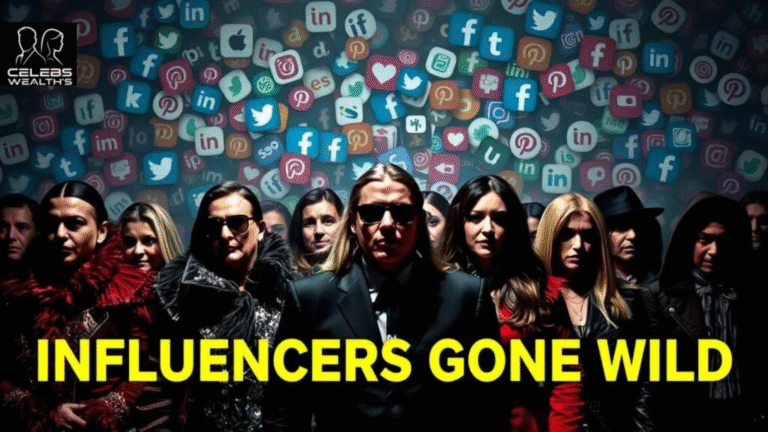influencer sued after stealing content: When copying goes too far
influencer sued after stealing content can sound scary, but it’s a real problem that affects many creators. Have you ever wanted to share a fun video, a photo, or a story—but ended up copying it from someone else without asking? That is exactly what can get an influencer in trouble. When someone copies someone else’s creative work without permission and claims it as their own, the original creator can get very upset. And in some cases, they may even take legal steps, like suing the influencer. This means the influencer has to go to court and explain what happened, and maybe pay money.
influencer sued after stealing content teaches us an important lesson: always ask and give credit. It means telling people where you got the content or asking permission to use it. If you don’t do that, you could be copying—sometimes even by accident—and that can cause big problems. You might lose friends, followers, or even get in legal trouble. Being kind, honest, and respectful of others’ creative work is the best way to stay safe and happy in the online world.
Why copying someone else’s work can get you sued
When you copy someone else’s work without permission, it is not just unfair, it can also break the law. The person who made that photo, video, or text owns it. This is called copyright. If you take it and post it like it is yours, they can get angry and take legal action. This means they might hire a lawyer and bring the case to court. For influencers, this can damage their career, money, and name. Fans may also lose trust because they like honesty. Copying feels easy, but it can create big trouble. That is why it is better to make your own content or ask before sharing someone else’s hard work.
What creators want you to know is a big problem for influencers.

Creators spend hours, days, and sometimes even months making their content. It is their art, their time, and their effort. When an influencer takes that work and shares it as their own, creators feel hurt and cheated. They also lose the chance to get credit, new followers, or even payment for their creativity. This is why many creators do not stay quiet when influencers steal their work. They want respect and fairness. Influencers who ignore this end up facing lawsuits, angry fans, and even brand deals being canceled. The lesson here is simple: give creators the respect they deserve. Sharing content should build relationships, not break them.In the long run, honesty always results in greater success.
How to share content safely: Ask, credit, or create your own
Sharing online is fun, but you must be smart about it. The safest way is to create your own videos, photos, or blogs. That way, no one can say you copied. But if you really like someone else’s content, you should ask them first. A simple message or email can show respect. If they say yes, you can also give credit by tagging them or writing their name in your post. This way, everyone knows who the real creator is. People respect influencers who are honest and give credit.In the world of the internet, it fosters friendships and trust.Remember: creating your own or asking first is always safer than stealing and risking legal trouble.
What happens in court when someone steals content
When an influencer gets sued for stealing content, the case goes to court. In court, the judge looks at the proof. The creator shows their original work, like videos, photos, or posts, and explains how the influencer copied it. If the judge agrees, the influencer might need to pay money, called a fine or damages. Sometimes they also have to delete the copied content and make a public apology. This process can be long, stressful, and very expensive. Court cases also bring bad press, which can damage an influencer’s online image. That is why going to court should always be avoided by being honest from the start. Respecting content rules is much easier than facing a lawsuit.
Real-life stories of influencers sued after copying
There are many real-life stories of influencers sued after stealing content. For example, some fashion influencers copied outfit photos from small creators and posted them without giving credit.The influencers lost money and followers as a result of the creators’ subsequent legal action.. Another case happened with travel bloggers who copied entire guides and shared them as their own. They faced lawsuits and lost brand deals. These stories remind us that no influencer is too big to get in trouble. Even famous names have been caught copying. The internet remembers everything, so one mistake can stay online forever. Learning from these stories is smart. It shows why respecting creators’ work is the best way to stay safe and successful online.
Easy steps to avoid stealing content online

It is simple to avoid stealing content online if you know the right steps. First, create your own work whenever possible, because nothing is safer than original content. Second, if you like someone’s post, ask for permission before using it. Most creators appreciate being asked. Third, always give credit when you share, by tagging or mentioning the creator’s name. Fourth, use royalty-free music, videos, or images from trusted websites, which are safe for public use. Fifth, learn a little about copyright rules, because knowledge protects you from mistakes. Following these easy steps keeps influencers out of trouble and helps build trust with their audience. Sharing with honesty makes your brand stronger and more respected in the long run.
Why honest sharing builds trust and keeps you out of lawsuits
Honesty is one of the most powerful tools for influencers. When you share content honestly, by giving credit or creating your own, people trust you more. Followers enjoy knowing that their favorite influencer respects others. This trust grows into loyalty, which means fans will keep supporting you. On the other hand, stealing content without asking destroys trust. People will see you as fake, and once trust is gone, it is hard to bring back. Brands also notice honesty. They want to work with influencers who are respectful and professional, not those facing lawsuits. Being honest keeps you safe from legal problems, but it also makes your online career stronger. Trust and honesty always lead to long-term success.
Ask permission or get in trouble: Influencer’s content rules
Every influencer needs to follow simple content rules. The most important one is: ask permission. If you see a post, photo, or video you like, message the creator before sharing. It takes only a few seconds, and it shows you respect their work. If you skip this step and post without asking, you could face trouble. The creator may report your account, block you, or even sue you. Platforms like Instagram, YouTube, and TikTok also take action against stolen content. Your account could get flagged or banned. These rules exist to protect creativity and fairness. Following them not only keeps you safe but also builds good relationships. Asking first is always smarter than fixing problems later.
Rights and respect: Why creators’ work matters

Every piece of content online has an owner. It may look simple, like a photo, song, or blog, but creators put their heart into it. That is why respecting their rights is so important. When someone steals it, it feels like their hard work is being taken away. Copyright laws exist to protect these rights, making sure creators get credit for what they do. Influencers must understand this because their careers depend on online trust. Respecting creators’ work means respecting the art, time, and ideas behind it. This respect also encourages more people to create, because they feel safe knowing their content won’t be stolen. Respect is not just good manners—it’s also the key to growing online.
Smart tips to avoid lawsuits from stealing content
Influencers can stay safe by following some smart tips. First, always plan your content ahead so you do not feel pressured to copy someone else. Second, use free or paid stock resources that come with permission to share. Third, if you get inspired by another creator, make sure your post is different and unique, not just a copy. Fourth, write or say in your post where the idea came from, so you give clear credit. Fifth, keep learning about copyright laws, because rules can change. These simple tips will protect you from lawsuits and also help you create a good reputation. The smartest influencers are the ones who mix creativity with respect. That balance
Conclusion
If an influencer is sued after stealing content, many people can get hurt.
Creators lose credit and money, and the influencer can lose fans and brand deals.
The easiest way to stay safe is to ask before you share and give clear credit.
Make your own posts when you can, and keep proof if you get permission.
Small steps like these keep your channel happy and trusted.
Being kind and fair online helps you grow for a long time.
Say sorry if you made a mistake, delete the copied post, and get it fixed right away.
Learning the rules and making fresh ideas will protect your name and work.
Keep practicing honesty and respect — this makes your online path strong.
FAQs
A: Save proof, ask them to remove it, report to the platform if needed, and get legal help if it is serious.
A: Original files, dates, links, messages, and screenshots that show who made the work first.
A: Yes. Any creator can try to stop copying, no matter how big or small they are.
A: Make your own content, ask permission to share, give credit, and use licensed images or music.
A: It means the creator says you copied their work without permission and asks a court to stop you or make you pay.




